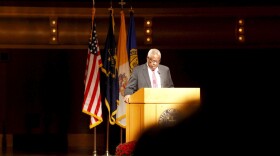U.S. Supreme Court Justice Samuel Alito spoke in defense of the court’s emergency docket at the University of Notre Dame Thursday.
Where it normally takes months to get a Supreme Court ruling, cases on emergency docket receive a ruling within hours or days. Applicants must show that their appeal is likely to win approval from four justices and that “irreparable harm” will occur if the court fails to take action.
The procedure is usually used for requests to stay federal executionos, but recent emergency rulings have struck down the Centers for Disease Control’s eviction moratorium, prevented the Biden administration from repealing a Trump-era immigration program and allowed a Texas law to stay in place that bans most abortions after six weeks.
The emergency docket is often referred to as the “shadow docket,” a term Alito called misleading.
“The catchy and sinister term ‘shadow docket’ has been used to portray the court as having been captured by a dangerous cabal that resorts to sneaky and improper methods to get its ways,” he said. “This portrayal feeds unprecedented efforts to intimidate the court and to damage it as an independent institution.”
Alito addressed ten common criticisms of the emergency docket Thursday, including that the court doesn’t issue full opinions in emergency rulings, the justices don’t receive full briefings and they don’t hear oral arguments.
Alito said those provisions take time and deliberation – two things justices can’t afford when they’ve been asked to rule in a matter of hours.
“You can’t expect the E.M.T.s and the emergency rooms to do the same thing that a team of physicians and nurses will do when they are handling a matter when time is not of the essence in the same way,” he said in comparison.
He also said emergency rulings are only a prediction of how a case would fare before the court, and aren’t a comment on the underlying precedents in the case.
Alito’s lecture comes after the Senate Judiciary Committee held a hearing Wednesday that questioned the court’s use of the emergency docket. Alito acknowledged that the court has issued more emergency rulings lately, but attributed the rise to the court receiving more applications due to the pandemic and the 2020 election.
When asked about misconceptions around the court’s role, Alito answered similarly to Justice Clarence Thomas, who spoke at Notre Dame earlier this month.
“The big misconception is that we are a policy-making body,” he said. “Members of the court have different judicial philosophies… but those are not disagreements about social policy.”
Ahead of the start of the court’s term Monday, Justices Amy Coney Barrett and Stephen Breyer have made similar remarks.
Contact Gemma at gdicarlo@wvpe.org or follow her on Twitter at @gemma_dicarlo.
If you appreciate this kind of journalism on your local NPR station, please support it by donating here.




